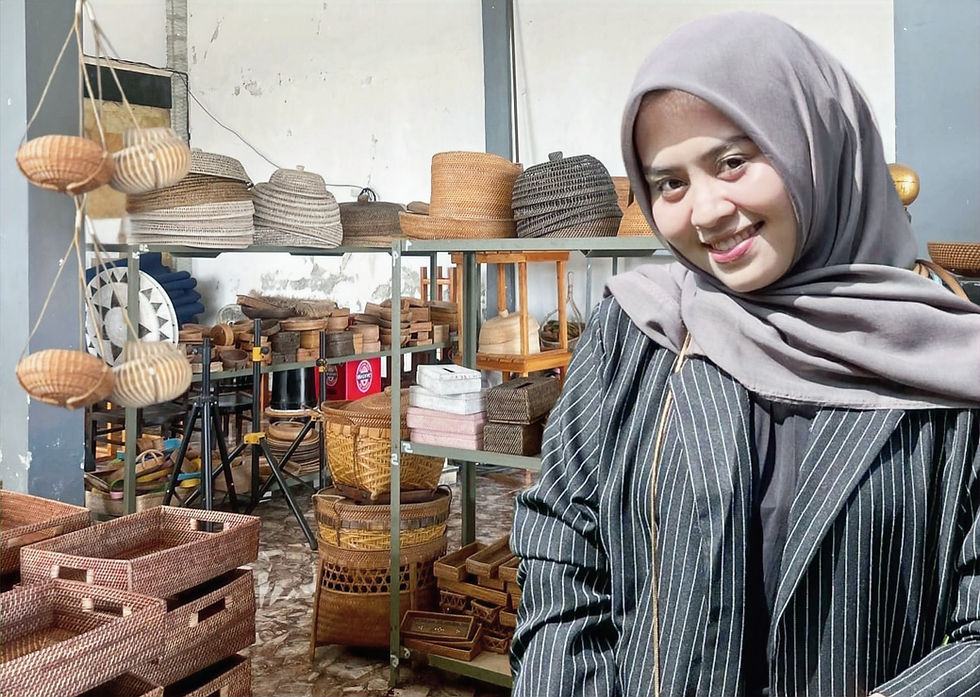HIMKI Reveals Impact of US 32% Tariff on National Furniture & Craft Industry
- Aug 7, 2025
- 3 min read

JAKARTA, July 9, 2025 – The Indonesian Furniture and Craft Industry Association (HIMKI) has stated that US President Donald Trump's policy to impose an additional 32% tariff on Indonesian products, effective August 1, 2025, will have a significant impact on the export of furniture and craft industry products. The US remains the largest export market for this sector, contributing approximately 54% of the total national furniture and craft exports.
HIMKI Chairman, Abdul Sobur, estimates that the value of Indonesian furniture and craft exports reached US1.5billion–US1.7 billion in the first half of 2025. Of this amount, exports to the US market are estimated to be around US800million−US900 million. The dominant products in the US export market include wooden furniture, rattan, outdoor furniture, decorative products, and various handicrafts.
In addition to the 32% tariff, Abdul Sobur also highlighted Donald Trump's idea of an additional 10% import tariff for members of the BRICS economic bloc. If this policy is implemented, Abdul estimates that it will have a direct impact on the selling price of Indonesian products in the US market. This condition has the potential to make Indonesian products less competitive compared to rival countries such as Vietnam, Malaysia, Mexico, India, Italy, and China.
"As a result, orders could be diverted to other more competitive countries. Business players could lose their market, and job absorption in this labor-intensive industry is threatened to decline," said Abdul
Industry Outlook and HIMKI's Hopes
Abdul Sobur added that furniture and craft industry players are currently awaiting decisions from buyers in the US, while also preparing to renegotiate volumes and prices. In general, this situation makes the prospect of the furniture and craft industry more challenging in the second half of 2025.
In addition to the pressure from US tariffs, industry players also face the challenges of global demand fluctuations, rising logistics costs, and increasingly fierce regional competition. HIMKI hopes that the Indonesian government can immediately take proactive trade diplomacy steps to renegotiate this tariff policy or find a mutually beneficial middle ground.
"At the same time, we encourage fiscal incentives, export stimuli, and policy protection for labor-intensive industries so they do not lose their competitiveness," said Abdul.
Opportunity Gaps and HIMKI's Strategic Recommendations to Face the US 32% Tariff
Amidst various challenges, Abdul Sobur still sees opportunity gaps that can support the performance of the furniture and craft industry. These opportunities come from home decoration trends, the demand for eco-friendly products, and the uniqueness of Indonesian crafts, which are important assets to remain competitive in the global market.
"HIMKI believes that with cooperation between the government, associations, and business players, this challenge can be transformed into a momentum for the Indonesian furniture & craft industry to become more resilient, advance to the next level, and be able to penetrate new markets with high-value-added products," said Abdul.
Previously, HIMKI had called for six measurable, integrated, and sustainable steps to curb this turmoil:
Export Tariff Diplomacy: Urge the government, especially President Prabowo, to reaffirm Indonesia's position as a long-term strategic partner of the US, ready to implement a fair and sustainable trade balance concept.
Nearshoring Strategy: Encourage production, finishing, or joint venture cooperation in key markets, such as North America or nearby regions, so that Indonesian products can still enter the market with a lower tariff scheme.
Export Market Diversification: Accelerate the completion of strategic agreements like IEU–CEPA and open access to BRICS, the Middle East, South Asia, Africa, and Oceania markets through the penetration of premium products and high-value-added niche markets.
Supply Chain Efficiency: Invite all industry players to reduce production and logistics costs by at least 10%, strengthen quality certification, and build a brand story that is relevant to global market trends.
Strengthening the Domestic Market: Encourage domestic market growth by 20–25% in the next three years as an important buffer amidst export market fluctuations.
Accessing Fiscal Incentives: Ask the government to ensure that fiscal incentives, export financing, and supporting facilities (including exemption from raw material duties and adjustments to supply chain regulations) can be accessed quickly and on target.
Abdul Sobur emphasized that tariff policy is not just about numbers, but concerns the fate of millions of workers and the future of a strategic national industry. "HIMKI is ready to be a strategic partner of the government in driving the growth of the furniture and craft industry towards a global market share. With solid, joint steps, Indonesia can become a world production hub and drive national economic growth to a double-digit level," he concluded.





















Comments